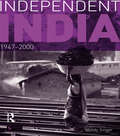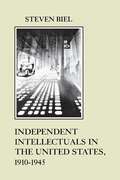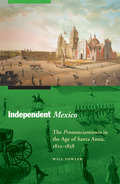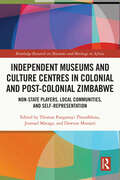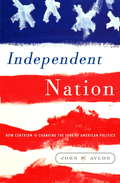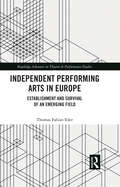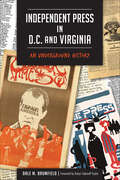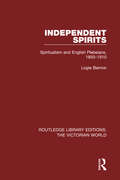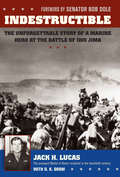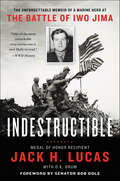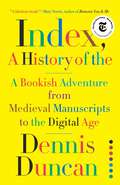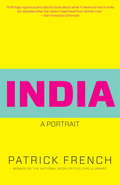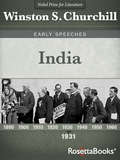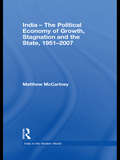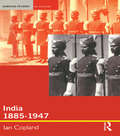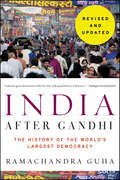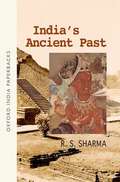- Table View
- List View
Independent India, 1947-2000 (Seminar Studies)
by Wendy SingerIndependent India is an exploration of India’s national history from independence in 1947 to the end of the twentieth century. Wendy Singer charts the rapid development of this emerging world power by following a series of different narratives crucial to the history of post-independence India: national integrations, the ongoing development of arts and culture, social movements, and political change. In telling the broader history of political movements and cultural transformations from different perspectives, this book provides key examples that demonstrate the experiences of women and men from the many classes and cultures that comprise modern India. In keeping with the series as a whole, this text also provides a range of primary source documents both to illuminate that history and to show the rich resources and unique challenges involved in writing contemporary history. Key features include: Thematic chapters within a chronological structure, incorporating different approaches to the study of history A varied range of primary sources, demonstrating the diversity of material available In-depth social, cultural and political analysis, including the study of regional identities, film, literature, gender, politics and economic change Investigating India’s recent national history from a range of angles, this new Seminar Studies volume is an essential introduction for anyone who wishes to learn more about the important place that India, the world’s largest democracy, has in our global age. .
Independent Intellectuals in the United States, 1910-1945 (The American Social Experience #1)
by Steven BielA new intellectual community came together in the United States in the 1910s and 1920s, a community outside the universities, the professions and, in general, the established centers of intellectual life. A generation of young intellectuals was increasingly challenging both the genteel tradition and the growing division of intellectual labor. Adversarial and anti-professional, they exhibited a hostility to boundaries and specialization that compelled them toward an ambitious and self-conscious generalism and made them a force in the American political, literary, and artistic landscape. This book is a cultural history of this community of free-lance critics and an exploration of their collective effort to construct a viable public intellectual life in America. Steven Biel illustrates the diversity of the body of writings produced by these critics, whose subjects ranged from literature and fine arts to politics, economics, history, urban planning, and national character. Conceding that significant differences and conflicts did exist in the works of individual thinkers, Biel nonetheless maintains that a broader picture of this vibrant culture has been obscured by attempts to classify intellectuals according to political or ideological persuasions. His book brings to life the ways in which this community sought out alternative ways of making a living, devised strategies for reaching and engaging the public, debated the involvement of women in the intellectual community and incorporated Marxism into its evolving search for a decisive intellectual presence in American life. Examined in this lively study are the role and contributions of such figures as Randolph Bourne, Max Eastman, Crystal Eastman, Walter Lippmann, Margaret Sanger, Van Wyck Brooks, Floyd Dell, Edmund Wilson, Mable Dodge, Paul Rosenfeld, H. L. Mencken, Lewis Mumford, Malcolm Cowley, Matthew Josephson, John Reed, Waldo Frank, Gilbert Seldes, and Harold Stearns.
Independent Mexico: The Pronunciamiento in the Age of Santa Anna, 1821–1858 (The Mexican Experience #No. 47.)
by Will FowlerIn mid-nineteenth-century Mexico, garrisons, town councils, state legislatures, and an array of political actors, groups, and communities began aggressively petitioning the government at both local and national levels to address their grievances. Often viewed as a revolt or a coup d’état, these pronunciamientos were actually a complex form of insurrectionary action that relied first on the proclamation and circulation of a plan that listed the petitioners’ demands and then on endorsement by copycat pronunciamientos that forced the authorities, be they national or regional, to the negotiating table. In Independent Mexico, Will Fowler provides a comprehensive overview of the pronunciamiento practice following the Plan of Iguala. This fourth and final installment in, and culmination of, a larger exploration of the pronunciamiento highlights the extent to which this model of political contestation evolved. The result of more than three decades of pronunciamiento politics was the bloody Civil War of the Reforma (1858–60) and the ensuing French Intervention (1862–67). Given the frequency and importance of the pronunciamiento, this book is also a concise political history of independent Mexico.
Independent Museums and Culture Centres in Colonial and Post-colonial Zimbabwe: Non-State Players, Local Communities, and Self-Representation (Routledge Research on Museums and Heritage in Africa)
by Thomas Panganayi ThondhlanaIndependent Museums and Culture Centres in Colonial and Post-colonial Zimbabwe presents case studies that grapple with the issue of ‘decolonising practice’ in privately owned museums and cultural centres in Zimbabwe. Including contributions from academics and practitioners, this book focusses on privately run cultural institutions and highlights that there has, until now, been scant scholarly information about their existence and practice. Arguing that the recent resurgence of such museums, which are not usually obliged to endorse official narratives of the central government, points to some desire to decolonise and indigenise museums, the contributors explore approaches that have been used to reconfigure such colonially inherited institutions to suit the post-colonial terrain. The volume also explores how privately owned museums can tap into or contribute to current conversations on decoloniality that encourage reflexivity, inclusivity, de-patriarchy, multivocality, community participation, and agency. Exploring the motives and purpose of such institutions, the book argues that they are being utilised to confront deeply entrenched stigmatisation and marginalisation. Independent Museums and Culture Centres in Colonial and Post-colonial Zimbabwe demonstrates that post-colonial African museums have become an arena for negotiating history, legacies, and identities. The book will be of interest to academics and students around the world who are engaged in the study of museums and heritage, African studies, history, and culture. It will also appeal to museum practitioners working across Africa and beyond.
Independent Nation: How the Vital Center Is Changing American Politics
by John AvlonFifty percent of American voters define themselves as political moderates, two-thirds favor political solutions that come from the center of the political spectrum, and Independents outnumber both Democrats and Republicans. Bill Clinton and George W. Bush each explicitly used Centrist strategies to win the White House—and twenty-first-century candidates will be compelled to do the same.Independent Nation documents the rich history of the defining political movement of our time. Organized as a series of short and colorful political biographies, it offers an insightful and engaging analysis of the successes and failures of key Centrist leaders throughout the twentieth century. In the process, it demonstrates that Centrism is not only a winning political strategy but an enlightened governing philosophy that best reflects the will of the people by putting patriotism ahead of partisanship and the national interest ahead of special interests.
Independent Performing Arts in Europe: Establishment and Survival of an Emerging Field (Routledge Advances in Theatre & Performance Studies)
by Thomas Fabian EderThis structural account of independent performing arts in Europe is complimented by an analysis of the challenging social situation within the field. This book presents a neo-institutional examination of the organizational field including its routines, scripts, and expectations which provides a contribution to theatre studies, labour studies, and to social and cultural policy studies as well as valuable context for current advocacy and governance. This study offers knowledge based on empirical data and thus a foundation that is equally important for scholarly discourse, cross-national learning, and scientifically based recommendations for action to administration, the cultural policy level, and associations alike. The book examines the independent performing arts communities in Austria, Bulgaria, the Czech Republic, Finland, Germany, Hungary, Iceland, Italy, Romania, Slovenia, Sweden and Switzerland.
Independent Press in D.C. and Virginia: An Underground History
by Dale M. BrumfieldThe nation's capital and the state of Virginia were a hotbed of political and social turmoil that marked the 1960s and 1970s. The area saw anti-Vietnam War protests, civil rights marches and students clamoring for a cultural revolution. Underground publications in D.C. and Virginia sprang up to document the radical change and question the "straight media." Off Our Backs led the charge for women's equality. The Gay Blade fought for the rights of homosexuals. Even the FBI began infiltrating the underground press movement by planting informants and creating fake magazines to attract suspicious "radicals." Join author and former underground editor Dale Brumfield as he traces the history of alternative press in the Commonwealth and the District.
Independent Spirits: Spiritualism and English Plebeians, 1850-1910 (Routledge Library Editions: The Victorian World #2)
by Logie BarrowFirst published in 1986. Independent Spirits is about the intellectual world of the humbly-born in late nineteenth- and early twentieth-century Britain, focussing on plebeian, or working- and lower middle-class spiritualists. This book is an important study which throws light on the idealism and search for knowledge that were so central in plebeian circles and in certain, very important parts of the labour movement during the nineteenth and early twentieth centuries. This title will be of interest to students of history.
Independent Wh-Exclamative Constructions in the History of English (Routledge Studies in Linguistics)
by Daniela SchröderThis book offers the first book-length treatment of the diachronic study of English exclamatives, tracing their development from 1500 through to the twenty-first century.The volume shines a light on independent wh-exclamatives in the history of English. In particular, Schröder calls attention to the development of three prototypical wh-exclamatives as observed in three newly created genre-balance corpora comprising prose fiction, dialogues, and personal correspondence, uncovering new insights into the differences in their evolution. In its analysis of English exclamatives over time and broader exploration of the impact of genre on constructional productivity, the book raises key questions about existing claims in scholarship on Diachronic Construction Grammar and outlines ways forward for new areas of inquiry. This volume will appeal to scholars interested in diachronic linguistics, historical syntax, language variation and change, and the history of English.
Indestructible
by Jack Lucas D. K. DrumDuring the battle of Iwo Jima, two enemy grenades landed close to Jack Lucas and his buddies. Jack threw himself on one of the grenades, grabbed the second, and pulled it beneath his body. His buddies were saved, but Lucas was badly injured. Miraculously, he survived-but just barely. For this brave action seventeen-year-old Jack Lucas from North Carolina became the youngest Marine in history to receive the Medal of Honor. Indestructible reveals the rocky road that led Jack Lucas to Iwo Jima, his arduous recovery, and the obstacles Jack overcame later in life. Jack's moving and powerful memoir is a testament to America's greatest generation.
Indestructible: One Man's Rescue Mission That Changed the Course of WWII
by John R BruningIn this remarkable WWII story by New York Times bestselling author John R. Bruning, a renegade American pilot fights against all odds to rescue his family--imprisoned by the Japanese--and revolutionizes modern warfare along the way.From the knife fights and smuggling runs of his youth to his fiery days as a pioneering naval aviator, Paul Irving "Pappy" Gunn played by his own set of rules and always survived on his wits and fists. But when he fell for a conservative Southern belle, her love transformed him from a wild and reckless airman to a cunning entrepreneur whose homespun engineering brilliance helped launch one of the first airlines in Asia.Pappy was drafted into MacArthur's air force when war came to the Philippines; and while he carried out a top-secret mission to Australia, the Japanese seized his family. Separated from his beloved wife, Polly, and their four children, Pappy reverted to his lawless ways. He carried out rescue missions with an almost suicidal desperation. Even after he was shot down twice and forced to withdraw to Australia, he waged a one-man war against his many enemies--including the American high command and the Japanese--and fought to return to the Philippines to find his family.Without adequate planes, supplies, or tactics, the U.S. Army Air Force suffered crushing defeats by the Japanese in the Pacific. Over the course of his three-year quest to find his family, Pappy became the renegade who changed all that. With a brace of pistols and small band of loyal fol,lowers, he robbed supply dumps, stole aircraft, invented new weapons, and modified bombers to hit harder, fly farther, and deliver more destruction than anything yet seen in the air. When Pappy's modified planes were finally unleashed during the Battle of the Bismarck Sea, the United States scored one of the most decisive victories of World War II. Taking readers from the blistering skies of the Pacific to the jungles of New Guinea and the Philippines to one of the the war's most notorious prison camps, Indestructible traces one man's bare-knuckle journey to free the people he loved and the aerial revolution he sparked that continues to resonate across America's modern battlefields.
Indestructible: The Unforgettable Memoir of a Marine Hero at the Battle of Iwo Jima
by Jack H. Lucas D. K. DrumMedal of Honor recipient Jack H. Lucas’s classic memoir of his heroics at the Battle of Iwo Jima—with a foreword by Bob Dole and reissued to coincide with the 75th anniversary of the battle in 2020.On February 20, 1945, the second day of the assault on Iwo Jima—one of the bloodiest battles of the Pacific theater in World War II—Private Jack Lucas, who was only seventeen, and three other Marines engaged in a close-proximity firefight with Japanese soldiers. When two enemy grenades landed in their trench, Lucas jumped on one and pulled the other under his body to save the lives of his comrades. Lucas was blown into the air as his body was torn apart by 250 entrance wounds. He was so severely wounded that his team left him for dead. Miraculously, he survived.While on the hospital ship Samaritan, his spirit soared to see the American flag flying atop Mount Suribachi—the same flag immortalized in Joe Rosenthal’s iconic photograph, Raising the Flag on Iwo Jima. Lucas endured twenty-one grueling surgeries and carried 200 pieces of shrapnel in his body for the rest of his life. Awarded the Medal of Honor, he became the youngest Marine in U.S. history—and the youngest of all World War II servicemen—to receive the honor.Indestructible tells the remarkable story of an extraordinary American possessed with a fierce determination to serve his country.
Indestructible: The Unforgettable Story of a Marine Hero at Iwo Jima
by Jack Lucas D. K. DrumHere is an eloquent, plainspoken combat memoir of a young soldier who belongs in a class with World War II combat hero Audie Murphy. At the height of the Battle of Iwo Jima, Jack Lucas and three other Marines attacked a Japanese pillbox. When two enemy grenades landed in their midst, Private Lucas jumped on both grenades, just as they were exploding. His buddies were saved, but Lucas was torn apart. Miraculously, he survived-but just barely. For this brave action seventeen year- old Jack Lucas from North Carolina became the youngest soldier in the twentieth century, and the youngest Marine in history to receive the Congressional Medal of Honor. InIndestructible, we learn of the rocky road that led Jack Lucas to Iwo Jima-from his lying about his age to join the Marines to his going AWOL in order to join the action in the Pacific-and his arduous, frightening recovery following his heroic sacrifice. Today, wherever Jack Lucas speaks crowds gather to honor him and pay tribute to Marine heritage and pride as well as to pay their respects to one of America's greatest generations.
Indestructible: The Unforgettable Story of a Marine Hero at Iwo Jima
by Jack Lucas D. K. DrumDuring the battle of Iwo Jima, two enemy grenades landed close to Jack Lucas and his buddies. Jack threw himself on one of the grenades, grabbed the second, and pulled it beneath his body. His buddies were saved, but Lucas was badly injured. Miraculously, he survived-but just barely. For this brave action seventeen-year-old Jack Lucas from North Carolina became the youngest Marine in history to receive the Medal of Honor. Indestructible reveals the rocky road that led Jack Lucas to Iwo Jima, his arduous recovery, and the obstacles Jack overcame later in life. Jack’s moving and powerful memoir is a testament to America’s greatest generation.
Index to the London Magazine (Routledge Revivals)
by Frank P. Riga Claude A. PranceThis book was originally published in 1978. The London Magazine is briefly told in the accomplisments and failures of its four editors, and during the fourteen months of his editorship, 1820-21, John Scott succeeded in establishing the London as one of the finest literary periodicals of the nineteenth century. John Taylor, the second editor, maintained the high quality of the magazine by securing many excellent writers. But by the end of 1825, the first year of Henry Southern's editorship, the magazine had lost most of its distinguished writers. When Charles night began editing the London in 1828, its great period was already a memory. This book presents a brief history of the magazine alongside the index.
Index, A History of the: A Bookish Adventure from Medieval Manuscripts to the Digital Age
by Dennis DuncanA New York Times Editors' Choice Book and a New Yorker Best Book of 2022 So Far Named a Most Anticipated Book of 2022 by Literary Hub and Goodreads A playful history of the humble index and its outsized effect on our reading lives. Most of us give little thought to the back of the book—it’s just where you go to look things up. But as Dennis Duncan reveals in this delightful and witty history, hiding in plain sight is an unlikely realm of ambition and obsession, sparring and politicking, pleasure and play. In the pages of the index, we might find Butchers, to be avoided, or Cows that sh-te Fire, or even catch Calvin in his chamber with a Nonne. Here, for the first time, is the secret world of the index: an unsung but extraordinary everyday tool, with an illustrious but little-known past. Charting its curious path from the monasteries and universities of thirteenth-century Europe to Silicon Valley in the twenty-first, Duncan uncovers how it has saved heretics from the stake, kept politicians from high office, and made us all into the readers we are today. We follow it through German print shops and Enlightenment coffee houses, novelists’ living rooms and university laboratories, encountering emperors and popes, philosophers and prime ministers, poets, librarians and—of course—indexers along the way. Revealing its vast role in our evolving literary and intellectual culture, Duncan shows that, for all our anxieties about the Age of Search, we are all index-rakers at heart—and we have been for eight hundred years.
India
by Patrick FrenchA monumental biography of the subcontinent from the award-winning author of The World Is What It Is: The Authorized Biography of V. S. Naipaul.Second only to China in the magnitude of its economic miracle and second to none in its potential to shape the new century, India is fast undergoing one of the most momentous transformations the world has ever seen. In this dazzlingly panoramic book, Patrick French chronicles that epic change, telling human stories to explain a larger national narrative.Melding on-the-ground reports with a deep knowledge of history, French exposes the cultural foundations of India's political, economic and social complexities. He reveals how a nation identified with some of the most wretched poverty on earth has simultaneously developed an envied culture of entrepreneurship (here are stories like that of C. K. Ranganathan, who trudged the streets of Cuddalore in the 1980s selling sample packets of shampoo and now employs more than one thousand people). And even more remarkably, French shows how, despite the ancient and persistent traditions of caste, as well as a mind-boggling number of ethnicities and languages, India has nevertheless managed to cohere, evolving into the world's largest democracy, largely fulfilling Jawaharlal Nehru's dream of a secular liberal order.French's inquiry goes to the heart of all the puzzlements that modern India presents: Is this country actually rich or poor? Why has its Muslim population, the second largest on earth, resisted radicalization to such a considerable extent? Why do so many children of Indians who have succeeded in the West want to return "home," despite never having lived in India? Will India become a natural ally of the West, a geostrategic counterweight to the illiberal rising powers China and Russia? To find the answers, French seeks out an astonishing range of characters: from Maoist revolutionaries to Mafia dons, from chained quarry laborers to self-made billionaires. And he delves into the personal lives of the political elite, including the Italian-born Sonia Gandhi, one of the most powerful women in the world.With a familiarity and insight few Westerners could approach, Patrick French provides a vital corrective to the many outdated notions about a uniquely dynamic and consequential nation. His India is a thrilling revelation.From the Hardcover edition.
India (Enchantment of the World)
by Don NardoAn introduction to the geography, history, culture, and people of India.
India (Routledge Revivals)
by C. H. PhilipsOriginally published in 1949, India does not attempt to provide a full history of the country, rather it brings to life the Indian story at the time by relating the position at the time of the new Indian Dominions to their historical background, and on the other hand, to concentrate attention on the political and economic growth of India, and to refer to other aspects when necessary. Therefore, it deals with the political and social legacy of ancient Hindu India and of medieval Muslim India in one chapter at the beginning, and the remainder of the volume is given to the description of the establishment and extension of European political rule and of the Indian reaction to it. Later chapters are concerned especially with India’s struggle for independence and the difficult transition which culminated in the Partition.This book is a re-issue originally published in 1949. The language used and views portrayed are a reflection of its era and no offence is meant by the Publishers to any reader by this re-publication.
India (Winston S. Churchill Early Speeches)
by Winston S. ChurchillA collection of speeches given by Churchill in the 1930s, fiercely opposing the India Bill and India home rule. In 1931, Britain's Conservative Party proposed the India Bill, a piece of legislation that would make significant changes to the way India governed itself under British rule. Winston Churchill was against the bill and defended his position with characteristic conviction and oratory brilliance. This book contains seven speeches and three important addresses Churchill gave on the subject, printed originally to generate popular support for Churchill's opinion. Churchill's opposition to Indian home rule is one of his more controversial political positions and led to a period of political isolation for him. Despite the strength of his oration, the India Bill was approved by Parliament in 1935. Documenting a rare loss for Churchill, these speeches provide an important insight into his mind and strategy as a political leader.
India - The Political Economy of Growth, Stagnation and the State, 1951-2007 (India in the Modern World)
by Matthew McCartneyUnderstanding the drivers and inhibitors of economic growth is critical for promoting development in less developed countries, including India. This book examines economic growth in India from 1951 to the present, challenging many accepted orthodox views. It argues that growth and stagnation should be considered over the medium term, and that the precise role of the state – in relation to particular historical and political-economic circumstances – is more important than the overall level of state involvement or disengagement. The book uses an empirical approach to contend that the state has an important role in several key areas including: mobilising a surplus; allocating the surplus in an efficient way to productive investment projects; and in building institutions (including political parties) through which conflict can managed between the different losers and rent-seekers affected by economic changes. It shows how, over time and in periods of growth and stagnation, the state in India has acted in key areas, and how the actions of the state has had a profound impact on economic outcomes. Overall, the book makes a major contribution to understanding the economic history of development in India and to understanding the role of the state in economic development more generally.
India 1885-1947: The Unmaking of an Empire (Seminar Studies)
by Ian CoplandThe establishment of the Indian National Congress in 1885 marked a turning point in modern South Asian history. At the time, few grasped the significance of the event, nor understood the power that its leader would come to wield. From humble beginnings, the Congress led by Gandhi would go on to spearhead India s fight for independence from British rule: in 1947 it succeeded the British Raj as the regional ruling power. Ian Copland provides both a narrative and analysis of the process by which Indians and Pakistanis emancipated themselves from the seemingly iron-clad yoke of British imperialism. In so doing, he goes to the heart of what sets modern India apart from most other countries in the region its vigorous democracy.
India After Gandhi: The History of the World's Largest Democracy
by Ramachandra GuhaFrom one of the subcontinent’s most important and controversial writers comes this definitive history of post-Partition India, now revised and updated with extensive new materialTold in lucid and beautiful prose, the story of India’s wild ride toward and since Independence is a riveting one. Taking full advantage of the dramatic details of the protests and conflicts that helped shape the nation, politically, socially, and economically, Ramachandra Guha writes of the factors and processes that have kept the country together, and kept it democratic, defying the numerous prophets of doom.Moving between history and biography, this story provides fresh insights into the lives and public careers of those legendary and long-serving Prime Ministers, Jawaharlal Nehru and his daughter, Indira Gandhi. Guha includes vivid sketches of the major “provincial” leaders, but also writes with feeling and sensitivity about lesser-known Indians—peasants, tribals, women, workers, and Untouchables.Massively researched and elegantly written, this is the work of a major scholar at the height of his powers, a brilliant and definitive history of what is possibly the most important, occasionally the most exasperating, and certainly the most interesting country in the world. This tenth anniversary edition, published to coincide with seventy years of India’s independence, is revised and expanded to bring the narrative up to the present.
India And The Contemporary World Part-2 (History) class 10 - Meghalaya Board
by Meghalaya Board of School EducationIdeal for the students of class 10, this India and the Contemporary World - 2 Textbook in History has been written in lucid language. Easy to understand the basic concepts, this revised version of the textbook has been published by Meghalaya Board of School Education.
